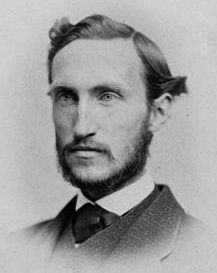Josiah Willard Gibbs
Josiah Willard Gibbs (February 11, 1839 – April 28, 1903) was an American scientist who made significant theoretical contributions to physics, chemistry, and mathematics. His work on the applications of thermodynamics was instrumental in transforming physical chemistry into a rigorous inductive science. Together with James Clerk Maxwell and Ludwig Boltzmann, he created the foundation of statistical mechanics, a branch of theoretical physics that explains the macroscopic properties of matter based on the probabilistic behavior of atoms and molecules.
Early Life and Education[edit | edit source]
Josiah Willard Gibbs was born in New Haven, Connecticut. He was the fourth of five children. His father, Josiah Willard Gibbs Sr., was a professor of sacred literature at Yale Divinity School. Gibbs showed early signs of genius, excelling in Latin, Greek, and mathematics. He entered Yale College in 1854, where he graduated in 1858, standing first in his class.
After graduation, Gibbs remained at Yale to pursue engineering, receiving the first Ph.D. in engineering granted in the US in 1863. His dissertation, titled "On the Form of the Teeth of Wheels in Spur Gearing," demonstrated his early interest in mathematical problems.
Academic Career[edit | edit source]
Gibbs spent most of his academic career at Yale, where he was appointed professor of mathematical physics in 1871. Despite the lack of advanced students in the field at Yale during his early years, Gibbs continued his research in relative obscurity. He published his most important work in the Transactions of the Connecticut Academy of Arts and Sciences because American journals at the time were not receptive to his abstract and mathematical approach to physics.
Contributions to Science[edit | edit source]
Gibbs's most notable contributions were in the field of thermodynamics and statistical mechanics. His paper "On the Equilibrium of Heterogeneous Substances" (1874-1878) is considered one of the greatest achievements in physical science in the 19th century. In it, Gibbs developed the concept of chemical potential, which allowed for the prediction of the behavior of substances in mixed phases, such as solids and liquids, and the direction of chemical reactions.
In statistical mechanics, Gibbs introduced the concept of the Gibbs ensemble, a statistical method that allows the calculation of the properties of a system from the properties of its constituents. His book Elementary Principles in Statistical Mechanics (1902) laid the groundwork for the development of quantum mechanics and was highly influential in the 20th century.
Legacy[edit | edit source]
Gibbs's work was not fully appreciated during his lifetime, partly because of his preference for publishing in obscure journals and his complex writing style. However, his contributions have been recognized as foundational in the fields of chemical thermodynamics and statistical mechanics. The Gibbs free energy, a thermodynamic potential that measures the "useful" work obtainable from a closed thermodynamic system, is named after him.
Gibbs was awarded the Copley Medal by the Royal Society of London in 1901, one of the highest honors in science, for his contributions to mathematical physics.
Death and Memorials[edit | edit source]
Josiah Willard Gibbs died on April 28, 1903, in New Haven, Connecticut. His legacy is preserved in the Gibbs Laboratory at Yale University, named in his honor. He is remembered as one of the greatest American scientists, whose work laid the groundwork for much of modern physical science.
Search WikiMD
Ad.Tired of being Overweight? Try W8MD's physician weight loss program.
Semaglutide (Ozempic / Wegovy and Tirzepatide (Mounjaro / Zepbound) available.
Advertise on WikiMD
|
WikiMD's Wellness Encyclopedia |
| Let Food Be Thy Medicine Medicine Thy Food - Hippocrates |
Translate this page: - East Asian
中文,
日本,
한국어,
South Asian
हिन्दी,
தமிழ்,
తెలుగు,
Urdu,
ಕನ್ನಡ,
Southeast Asian
Indonesian,
Vietnamese,
Thai,
မြန်မာဘာသာ,
বাংলা
European
español,
Deutsch,
français,
Greek,
português do Brasil,
polski,
română,
русский,
Nederlands,
norsk,
svenska,
suomi,
Italian
Middle Eastern & African
عربى,
Turkish,
Persian,
Hebrew,
Afrikaans,
isiZulu,
Kiswahili,
Other
Bulgarian,
Hungarian,
Czech,
Swedish,
മലയാളം,
मराठी,
ਪੰਜਾਬੀ,
ગુજરાતી,
Portuguese,
Ukrainian
Medical Disclaimer: WikiMD is not a substitute for professional medical advice. The information on WikiMD is provided as an information resource only, may be incorrect, outdated or misleading, and is not to be used or relied on for any diagnostic or treatment purposes. Please consult your health care provider before making any healthcare decisions or for guidance about a specific medical condition. WikiMD expressly disclaims responsibility, and shall have no liability, for any damages, loss, injury, or liability whatsoever suffered as a result of your reliance on the information contained in this site. By visiting this site you agree to the foregoing terms and conditions, which may from time to time be changed or supplemented by WikiMD. If you do not agree to the foregoing terms and conditions, you should not enter or use this site. See full disclaimer.
Credits:Most images are courtesy of Wikimedia commons, and templates, categories Wikipedia, licensed under CC BY SA or similar.
Contributors: Prab R. Tumpati, MD






